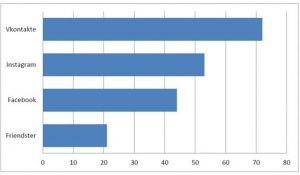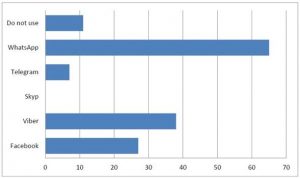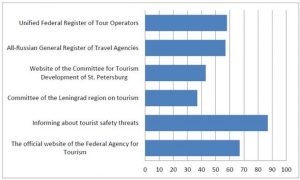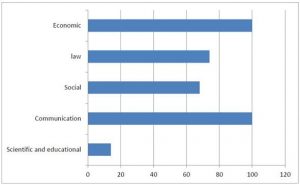Conducted research is aimed to reveal communication trends in formation of institutional business environment in tourism of St. Petersburg. As a result, it was revealed that communication trends are due to the tourism multiplier effect and take into account changes in the institutional tourism environment within the framework of new information communication technologies, such as online booking services, tourist information centers, etc. Communication part of institutional business environment in tourism combines such information communication technologies as automatic information system „Unified Federal Register of tour operators“, „Safety treats information for tourists“, official website of Federal Tourism agency, online booking systems etc.
Stable communication trends in formation of institutional business environment in tourism of St. Petersburg are: the growth of the number of information tourist centers and mobile services, that make an access to tourism services of every level easier; different forms of collaboration (bloggers, online events etc.); improvement in quality, speed and safety of tourist services.
1 Introduction
The paper is aimed to identify institutional environment of business development in tourism with consideration of rapid development of communication and information technologies. The aim of this research is to identify communication trends within institutional business environment in tourism industry of St. Petersburg. Achieving this goal requires consistent meeting the challenges, such as: looking at the structure of institutional environment of tourism, analysing the process of its formation and factors, that make its identification harder; as well as conducting a survey for tourism agencies representatives in St. Petersburg.
The analysis of the institutional business environment structure in tourism is based on the system approach. Theoretical importance of the research includes the need to summarize the most important results of the problem identification research of the institutional business environment with consideration of the tourism industry specifics and identification stable communication trends in tourism of St. Petersburg.
2 Theory of tourism business institutional environment identification
In the second half of the 21st century North and Dewis (1971) explained institutional environment as a complex of basic political, social and legal rules, that regulates operations of economic subjects, predetermining possibilities to maximize distribution and productive
activity.
Particular explanation fully corresponds to the approach for identification of institutional business environment in tourism that is regulated by identical set of regulating rules.
Russian scientist Shastitko (2010) considers institute as a set of rules, that fulfills the function of restricting economic agents, that puts communication between them in order, as well as the mechanisms controlling these rules.
Lazovskaya (2012) thinks, that institutional environment of tourist services consists of a complex of the following institutions, such as:
- economic,
- institute of social environment (especially cooperation between the authorities and society, superior and subordinate relationship to labor, management features, informal relations, etc.),
- institute of spiritual environment (features of national character, morality, spirituality, patriotism, etc.),
- institutional environment and its restrictions form an effective competitive economic mechanism in tourism services, which supports stability and system adaptation.
Williams (1990), 2009 Nobel Prize laureate, determined institutional environment as a summary of rules, that determine the context of realization of economic activity, Another famous American scientist – Klein (1998) thought that its institutional environment that sets the restrictions, in which individual functions. That statement explains the role of tourist in institutional business environment in tourism very well.
3 Multiplicative effect of tourism business
The above studies do not account for changes in the institutional environment of tourism in the context of new information and communication technologies such as the internet – reservation services, tourist information centers, etc. Tourism business from the institutional approach, according to the presented Table 1, can be considered as combination of a number of „hard” and „soft” institutions and a system of
interaction mechanism.
Development institutions complement each other, so when any system changes in the expected economic effect in a particular institutional environment depends on the adaptability of its elements to constant changes.
| Institute | Functions | Subjects |
| Economic | The market interaction mechanism of subjects and objects in tourism | Accommodation facilities, transport companies, travel agents, tour operators, tourist facilities, museums, tourists, catering and related industries, etc. |
| Legal | International and Russian legal and regulatory – methodological base. Implementation of state programs for the development of education, physical culture and sports, culture and tourism, health care, economic development and an innovative economy | UNWTO, Federal Agency for Tourism (Rosturizm), Ministry of Culture of the Russian Federation Federal, regional and municipal executive and legislative powers in the field of development and security |
| Social | Culture, social structure, national characteristics, tolerance level | Russian Ministry of Culture, public, commercial and government organizations in the field of national and world culture, the population of tourist destinations |
| Communication | Information and communication technologies | Automated information systems „The Unified Federal Register of Tour Operators“, „Informing about the threats to the safety of tourists“, the official website of the Federal Agency for Tourism, booking systems, etc. |
| Scientific and educational | Educational programs and research projects in the tourism specialists training | Public and private educational organizations that provide training for the tourism |
Table 1: Structure of the institutional environment in tourism
Source: Authors
Multiplier effect of business in tourism causes the institutional environment for its development, as the totality of the tourism subjects and objects, and relationships that arise between them in the process of tourist services production and consumption. These relations system forms the institutional factors of tourism development in close relationship with other areas of business.
4 Legal background of the communications component in the tourism institutional business environment
The rapid development of the Internet – technologies and communication, and the Federal Law of Russia No 49-FZ On Amendments to Certain Legislative Acts of the Russian Federation in order to improve the legislation regulating the tourism activity formed the preconditions for the formation of the Institute of Communications in the institutional environment in tourism (kremlin.ru 2017).
This law is aimed at improving the legislation in terms of legal regulation of outbound tourism, strengthening the responsibility of the participants of the tourist market, improving the quality of services provided and the level of legal protection of tourists traveling outside the territory of the Russian Federation.
Introduced concepts such as „Navigation and orientation system in tourism“, „Tourist information center“, witch indicates that the sustainable development of the communication component of the institutional environment of tourism and recreation. In addition, the Federal Law No. 49-FZ of support and development „of children’s tourism“ related to priority areas of state regulation of tourist activities as well as with internal, inbound, social and backpackers.
Entry into force on January 1, 2017 of the provisions on the specification of powers in the field of tourism at the federal, regional levels, as well as the definition of the rights of municipalities in the development of tourism will contribute to the development of domestic and inbound tourism, improving the quality and safety of tourist services, the formation, promotion and implementation competitive domestic tourism products, as well as attracting investment, increasing employment, increasing the size of small and medium-sized businesses, municipal revenues regional, federal, socio-economic development of the regions and Russia as a whole.
So, the scope of the institutional environment of tourist-recreational services includes the following set of functioning institutions, such as:
- economic, implementing mechanism of market interaction of subjects and objects of tourism such as accommodation facilities, transportation companies, travel agents, tour operators, tourist display objects, museums, tourists, catering and related industries, etc.,
- law, allows to improve the international and Russian legal and regulatory and methodological framework and implement national programs of education, physical culture and sport, culture and tourism, health care, economic development and innovative economy in the framework of the UNWTO, the Federal Agency for Tourism (Rosturizm), Ministry culture of the Russian Federation, etc.,
- social, includes culture, social structure, national characteristics, level of tolerance, etc. The Ministry of Culture of the Russian Federation, public, commercial and state organizations in the field of national and world culture, the population of tourist centers are elements of this institutional subsystem,
- research and education implement educational programs and research projects in the field of training of specialists of tourist sphere, carried out by public and private educational and research organizations,
- communications combine information and communication technologies, such as: automated information systems „The Unified Federal Register of Tour Operators”, „Informing about Tourist Safety Threats”, the official website of the Federal Agency for Tourism, booking systems, etc. Communication institute becomes the most important element of the institutional tourist activity environment, since the relevant information possession, speed, accuracy; high speed processing and transmission of information are crucial factors of company’s efficiency in the tourism.
5 Detecting development trends of communication technologies in the field of tourism industry of St. Petersburg
In order to identify sustainable communication trends of the institutional tourism business environment formation in the period from 10.10.2018 to 28.11.2018 we conducted a survey of travel company’s representatives/heads in St. Petersburg. The survey „Communications in the field of St. Petersburg tourism industry” involved 138 respondents, which made up a sample of more than 10% of the total population (1118) of registered in St. Petersburg companies that provide services in tourism.
As a result of the study, it was revealed that 100% of respondents have their own website on the Internet. The site publishes information about offers, which can be used any time convenient to the user, however, not every website has a user-friendly interface, that
sometimes causes difficulties in quickly finding the desired information. In addition, not all websites have a resource selection of tours and online reservations, but only submit to the price list.
The tourism industry companies’ presence in the social media also covers 100%. The least attractive to promote their services to the organization of St. Petersburg is „Classmates“ network (Figure 1).

Figure 1: Presence of St. Petersburg tourist companies in social media
Source: Authors
This is mainly due to the prevailing strong stereotypes about these networks, some of which are quite reasonable and really interfere with the work of travel industry companies (Alexeenko 2018). Regarding the use of instant messengers to inform customers, according to the respondents’ answers, WhatsApp, Viber and Facebook are used more frequently in their work (Figure 2).

Figure 2: Preference tourist companies using messengers
Source: Authors
This is quite natural, since, according to the Russian Fund „Public opinion“, the most popular application for communication among Russians is WhatsApp: it is used by 39% of all respondents and 58% of daily Internet audience. Viber is installed on devices by 29% of respondents (43% of the daily audience), Skype – by 19% of residents (29% of the daily audience), Telegram is used by 10% of Russians (15% of the daily Internet audience), ICQ is used by only 1% of citizens (Bashkatov 2018).
On the question of public information and communication resources that can make the company work more efficiently, the majority of respondents cited the section „Information about the security threat“ to the Federal Tourism Agency website (Figure 3).

Figure 3: State information and communication resources used by tourist companies
Source: Authors
This is due to the complicated international situation in general and, in particular, deteriorating security conditions at the popular destinations of Russians (Turkey, Egypt, Thailand, etc.). Among the information and communication technologies contributing to the improvement of the quality of tourist services, the Internet was the leader in the number of answers. Also named respondents were services such as SSL Certificate Komodo, amoCRM, Zendesk, etc. With regards to the introduction of new information and communication technologies, most respondents plan to use automated marketing platforms, such Mindbox. These systems allow almost few clicks to set up the sales funnel, to segment the market, set up sales scripts for managers, and improve customer loyalty, increase average check and much more.
Communication (along with economic) component of the institutional environment of entrepreneurial activity of tourism is the most important by respondents’ opinion (Figure 4), and is characterized by a number of stable trends, such as:
- rapid development of information communication due to the multiplier effect of tourist areas,
- growth in the number of mobile applications for booking accommodation, buying tickets for all modes of transport, food delivery, virtual tours and navigation systems; emergence of new information tourist centers,
- collaboration of international payment systems with airlines, hotel chains, and so on within the various customer loyalty programs, bloggers popularization activities and increase the authority of „unofficial“ information that consumers of tourism services often rely to a greater extent than the „official“,
- acceleration of information transmission speed to prevent danger to life, health, safety and improving the quality of tourism and recreational services.

Figure 4: The most important elements of the institutional environment tourism and recreation activities
Source: Authors
6 Conclusion
The authors concluded that the automation of management processes and the introduction of information and communication technologies in the entrepreneurial sector of the tourism industry of St. Petersburg is proceeding at an active pace. The overwhelming majority of organizations are willing to rapidly introduce the latest technologies and use communication tools in the business, thereby increasing the efficiency of their activities. The increase in the number of tourist information centers and mobile services simplifies access to tourist services at all levels and increases the speed and quality of their provision. However, the problem of building an effective system of interaction between tourism enterprises and their partners, subagents and directly potential tourists in the online mode remains open. This is especially important in the conditions of high competition in the market of tourist services in St. Petersburg and a permanent increase in prices and an increase in the main items of expenditure of citizens. The presence on the Internet, social networks, instant messengers and the presence of mobile applications clearly increase the likelihood of increasing the efficiency of the travel industry company, but with close contact with the user, because without this, no software product alone can work and bring the desired result.
Literatúra/List of References
- Alekseenko, T. F., 2018. Almost half of Russians do not use instant messengers. 2018. [online]. [cit. 2018-12-22]. Available at: <https://www.kommersant.ru/doc/3618010>
- Bashkatov, D., 2018. Myths and truth about the audience network odnoklassniki. [online]. [cit. 2018-12-22]. Available at: <https://smmplanner.com/blog/mify-i-pravda-ob-auditorii-setiodnoklassniki/>
- Davis, L. and North, D., 1971. Institutional change and American economic growth. Cambridge: Cambridge University Press, 1971. ISBN 9780511561078.
- DrachevaYa, V. and Lazovskaya, V. S., 2012. Krasnodar: Southern Institute of Management, 39, 2012. [online]. [cit. 2018-12-01]. Available at: <http://www.iprbookshop.ru/9767.html>
- Klein, P., 1998. New institutional economics. Department of Economics, University of Georgia
- Kremlin.ru, Federation in order to improve the legislation regulating the tourism activity. 2017. [online]. [cit. 2018-12-01]. Available at: <http://kremlin.ru/acts/bank/40571>
- Shastitko, A. E., 2010. New institutional economic theory. In: Voprosy Ekonomiki. 2010, 8, pp. 152-154. ISSN 0042-8736.
- The Federal Law of Russia 03.02.2016, No. 49-FZ On Amendments to Certain Legislative Acts of the Russian Federation
- Williamson, O., 1990. Organization theory: from Chester Barnard to the present and beyond. Oxford: Oxford University Press, 1990. ISBN 9780195061444.
Kľúčové slová/Key words
communication trends, tourism, information tourist center, tourist services
komunikačné trendy, cestovný ruch, turistické informačné stredisko, turistické služby
JEL klasifikácia/JEL Classification
M31
Résumé
Trendy v komunikácii pri formovaní inštitucionálneho podnikateľského prostredia v cestovnom ruchu v Petrohrade
Cieľom uskutočneného výskumu je odhaliť komunikačné trendy vo formovaní inštitucionálneho podnikateľského prostredia v cestovnom ruchu v Petrohrade. Výsledkom bolo zistenie, že komunikačné trendy sú dôsledkom multiplikačného efektu cestovného ruchu a zohľadňujú zmeny v inštitucionálnom prostredí cestovného ruchu v rámci nových informačných komunikačných technológií, ako sú online rezervačné služby, turistické informačné centrá atď. Komunikačná časť inštitucionálneho podnikateľského prostredia v cestovnom ruchu kombinuje také informačné komunikačné technológie ako automatický informačný systém „Jednotný federálny register cestovných kancelárií“, „Bezpečnosť zaobchádza s informáciami pre turistov“, oficiálna webová stránka Federálnej agentúry cestovného ruchu, online rezervačné systémy atď.
Stabilné komunikačné trendy vo formovaní inštitucionálneho podnikateľského prostredia v cestovnom ruchu v Petrohrade sú: rast počtu informačných turistických centier a mobilných služieb, ktoré uľahčujú prístup k turistickým službám na všetkých úrovniach; rôzne formy spolupráce (blogeri, online udalosti atď.); zlepšenie kvality, rýchlosti a bezpečnosti služieb cestovného ruchu.
Recenzované/Reviewed
24. March 2019 / 29. March 2019












